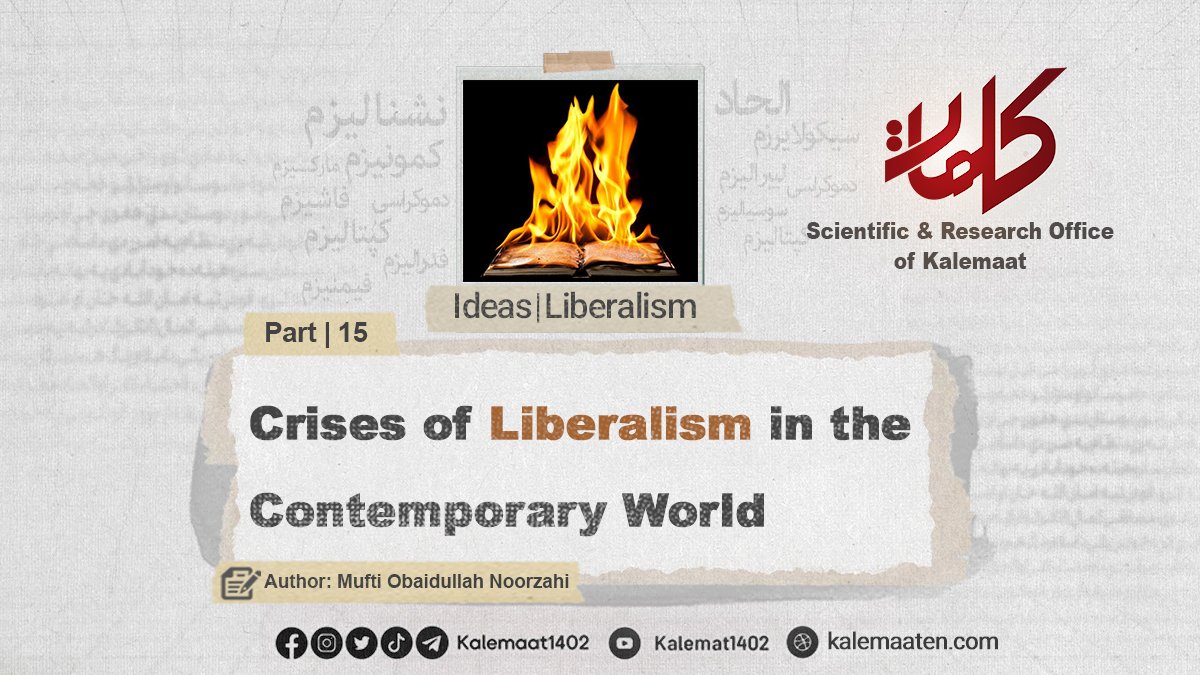Author: Mufti Obaidullah Noorzahi
Crises of Liberalism in the Contemporary World (Part 15)
Islam and Freedom
The revealed nature of Islam, for those unfamiliar with religion, at first glance gives the impression that seeking definitions and boundaries for freedom and other human rights concepts within Islam and the Qur’an is a fruitless and idealistic endeavor. These individuals assume that such concepts are the byproducts of modern life and contemporary thought, and that the maximum responsibility of religion is to regulate the relationship between humans and the Creator. Therefore, religion should not be expected to manage the complex human relations throughout history.
This perception of religion is largely influenced by the current state of Christianity and dominant religious scholarship in the West, which has also influenced other cultures, societies, and nations. In Muslim countries as well, some individuals who either lack sufficient knowledge of Islam and Islamic tradition or are affected by the presumption that the West is the source of valid rational discoveries in experimental sciences and technological advancements, assume that Western findings in the humanities—especially in the study of religions—are also worthy of being used as models for understanding other religions, including Islam.
Whenever these individuals encounter Qur’anic verses or Prophetic traditions that conflict with their assumptions and preconceptions, they tend to interpret or justify them based on those very assumptions. Their preconceived notions affect their understanding to such a degree that they merely project their own ideas onto the texts. However, if one approaches the analysis and study of religion without prejudice and without making Western religious studies the standard of evaluation, and instead takes religious texts as the true criteria, one can discover human rights teachings not only in Islam but also in other divine religions.
The Holy Qur’an, in its account of the mission and message of Prophet Moses and the teachings of the Jewish religion, reveals that in the very first stages of his movement and struggle, Moses rose up against the tyrant and oppressive ruler of his time—Pharaoh—and raised the call for freedom. His call was not just for the liberation of land, economic resources, or even inner freedom and spiritual struggle, but rather, it had a deeply social and political nature: “أَنْ أَدُّوا إِلَيَّ عِبَادَ اللَّهِ” Translation: “(O oppressors,) deliver the servants of Allah to me!” [1]
Pharaoh’s response to this call for freedom by Moses (peace be upon him) was: “أَنَا رَبُّكُمُ الْأَعْلَى” Translation: “I am your supreme lord.” [2]
Pharaoh’s intent in saying this and similar claims was not to assert that he created the people, but to declare that the management of their affairs was in his hands, and people must submit to his decisions and commands without question, regarding them as the law of life. Pharaoh and his followers were idolaters, and part of his rage and opposition to Moses stemmed from the fact that Moses, in addition to striving for the liberation of the Children of Israel from Pharaoh’s tyrannical rule, denied the divinity of the idols worshipped by Pharaoh and his people: “وَقَالَ الْمَلَأُ مِنْ قَوْمِ فِرْعَوْنَ أَتَذَرُ مُوسَى وَقَوْمَهُ لِيُفْسِدُوا فِي الْأَرْضِ وَيَذَرَكَ وَآلِهَتَكَ قَالَ سَنُقَتِّلُ أَبْنَاءَهُمْ وَنَسْتَحْيِي نِسَاءَهُمْ وَإِنَّا فَوْقَهُمْ قَاهِرُونَ” (127) Translation: “The chiefs of Pharaoh’s people said, ‘Will you leave Moses and his people to spread corruption in the land and forsake you and your gods?’ Pharaoh said, ‘We shall kill their sons and spare their women. Indeed, we have full power over them.’” [3]
Pharaoh responded in the typical manner of tyrants and despots: “We shall kill their sons (the men) and let their women live (to serve us). We have power over them and are superior to them.” Pharaoh reminded Moses that he had raised him in his own palace as a child, as though to hint at extending his favor once more—provided that Moses would stop speaking of freeing the Israelites and endorsing the despotic rule and false beliefs of Pharaoh. However, Moses replied: “Do you hold your favor over me for having enslaved the Children of Israel?” Who could consider this dialogue merely an effort by Moses to promote inner freedom or spiritual struggle, while ignoring its clear and evident social and political dimensions? The Holy Qur’an, on the one hand, introduces the Prophets as messengers of freedom, justice, equity, and equality: “لَقَدْ أَرْسَلْنَا رُسُلَنَا بِالْبَيِّنَاتِ وَأَنْزَلْنَا مَعَهُمُ الْكِتَابَ وَالْمِيزَانَ لِيَقُومَ النَّاسُ بِالْقِسْطِ وَأَنْزَلْنَا الْحَدِيدَ فِيهِ بَأْسٌ شَدِيدٌ وَمَنَافِعُ لِلنَّاسِ” Translation: “We certainly sent Our messengers with clear proofs, and with them We sent down the Scripture and the balance so that people may uphold justice. And We sent down iron, with its great might and benefits for humanity.” [4]
And on the other hand, it describes the opponents of prophets like Abraham, Shoaib, Noah, Moses, and others as oppressive tyrants.
Therefore, denying the liberating mission of the prophets and claiming that religions lack teachings on justice, freedom, and equality—and attributing all political and social freedom to the Western liberal ideology—is either ignorance or a grave error.
Alexis de Tocqueville (1805–1859), the French thinker and writer, says: “It is the adherence to divine laws that guides man to freedom.”
A study of the historical path of prophetic missions also shows that among the various social classes during the time of each prophet, it was the oppressed, the slaves, and those deprived of freedom and justice who first responded to the prophets’ call and accepted their way and law.
If we were to consider the mission of the prophets solely focused on inner freedom and spiritual struggle, then the vanguard role of the downtrodden, the enslaved, and those whose political, social, and civil rights were trampled would not make any rational or comprehensible sense in accepting the message of the prophets.
Continues…
Previous Part/ Next Part
[1] ـ Surah Dukhan, Verse: 18.
[2] ـ Surah Naziat, Verse: 24.
[3] ـ Surah Araf, Verse: 127.
[4] ـ Surah Hadid, Verse: 25.



